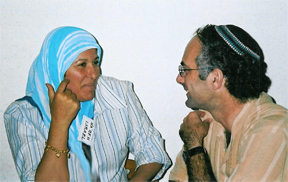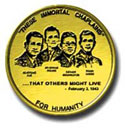
|
|
Middle East Peace Talks: An interview with Dr. Yehuda Stolov
We understand the history of interfaith dialogue in Israel emerged from a long-held commitment beginning in the late 1950s. Tell us how the Interfaith Encounter Association (IEA) was later established and about its roots, vision and goals?
How were you first drawn into the interfaith field? How have you attracted other interfaith leaders to guide the way for IEA? I came into interfaith dialogue some 14 years ago. At that time, it was still the "traditional" interfaith dialogue, but I was just interested in having conversations with people of other faiths, mainly Christians. This mere interest kept me going for several years, in which I became more involved with the international interfaith, mainly Jewish-Christian, dialogue. Then a real passion and conviction started to grow in me as I began to build a deeper understanding that interfaith dialogue, conducted in an interactive way, can be a very powerful tool for the building of inter-personal relations and transforming mutual prejudices and fear into mutual understanding, respect and trust. This understanding led to my organization of several Israeli-Palestinian and Middle East conferences that in turn supported this understanding. With the passing time, we learned that the more interactive the dialogue, the more effective it was as a tool ---- much of the time in our sessions is devoted to participants experiencing a deep and positive interaction with others. We also learned that in order for the interfaith encounters to become a real social movement for change, it is necessary to have very large numbers of programs and many people organizing them. We chose a structure with a network of interfaith teams that work with a large degree of autonomy. Both these new understandings did not coexist with the "traditional" interfaith dialogue previously. The traditional approach has as its main goal to educate about the religion of the other and therefore requires a large degree of control in order to ensure that the correct information is conveyed. Different from the interactive dialogue with significant time spent in dialogue to build mutual understanding, respect and trust, the traditional programs organizes all activities from the Center. The main emphasis on the selected speakers, leaving the audience relatively passive. Seeing the value in this new and different interactive approach, we established the Interfaith Encounter Association (IEA). The establishment of IEA with these ideas and guiding principles, using interactive dialogue to build mutual understanding, respect and trust, attracted many people concerned with the promotion of good relations between the different people and communities of the Holy Land, but who were dissatisfied with existing efforts---the more politically-oriented dialogues that nearly completely ignored religion. Which of your sponsored activities and events have been the most rewarding? Can you share a few examples of the events that were most beneficial or meaningful. The most rewarding are not one-time activities, but groups of on-going activities. We currently have fourteen ongoing programs. A few of them are especially exciting: 1. Karmiel and Majd el-Krum Program: The group of Karmiel and Majd el-Krum that is centered around the two main schools of these towns. It started modestly with a small group of 10 educators from each of the schools, grew to include activities with the pupils. They started with limited activities in a “neutral" place, outside both towns. Today they have regular activities with pupils of each of the classes from 1st grade onwards. Engaging the pupils has also helped us to attract their parents to join. Currently this group involves 800 pupils and 200 adults. 2. Neighborhoods in Jerusalem. A group that focuses on deprived neighborhoods in Jerusalem - Gilo for the Jewish part and Shuafat refugee camp for the Muslim part. This group is conducted in cooperation with the Wellspring for Democratic Education, an organization that works to empower people of deprived neighborhoods. It is exciting as usually interfaith dialogue, and any dialogue, is limited to middle class and the lower socio-economic classes are not represented, 3. Village of M'ghar. A group that we formed in the village of M'ghar that suffered from clashes between Christians and Druze. This group is unique both in that it was formed as a direct response to local violent events and in that it does not include Jews, but the Druze, Christians and Muslims living in the village. What breakthroughs, however modest, have you witnessed in the encounters you've sponsored? Can you share a couple of meaningful stories? Here are three examples of the breakthroughs that we have witnessed through interactive dialogue focused on building mutual understanding, respect and trust: • Middle East Interfaith Encounter Conference. • Israeli-Palestinian Conferences. With time, the most striking element was the fact that this was not surprising any more and all the tension before the retreats was completely gone. We KNEW for sure that this is how the process goes when people come together with an opportunity for interaction and discovery of one another, despite what is constantly going on in the “outside world". • Relations with an interfaith institute in Iran. From your perspective, what have been the greatest obstacles to overcome? Most people would probably think that the biggest obstacle is convincing people to join, but actually our a-political and inter-religious approach is very appealing to people. The greatest obstacle is getting the funding to sustain the on-going activities that are already in place and to implement new programs. We are constantly in the situation that we have many more programs that we are ready to implement, but the difficulty is finding the necessary funds to support them. What are your greatest hopes for peace among all people? My hopes go along the circles of activity of the IEA: I first hope that peace and harmony will prevail among the Jews, Muslims, Christians and Druze in Israel; then among the people of the Holy Land, then among the people of the Middle East and then among people of other conflict-zones and the whole world. And when I say, “Peace and harmony," I do not mean just cessation of war; I really mean harmony of friendship and love. From your vantage point, what is the call-to-action for all people at this time in history? The call for action is for engaging in interactive interfaith dialogue of deep and positive interaction: Take part in encounters with others different than you.
Real peace is possible. It does indeed require work. After being involved in these interactive dialogues focused on building mutual understanding, respect and trust, I believe it is much easier to achieve than one would think. |
|||||


 Dr. Stolov organized colleagues from Muslim, Christian, Jewish and Druze faiths in 2001 to counter the escalating violence between Israelis and Palestinians. Risking their lives, they held public seminars to break down hostility and mistrust and have now created a sustainable model of Interfaith understanding and hope.
Dr. Stolov organized colleagues from Muslim, Christian, Jewish and Druze faiths in 2001 to counter the escalating violence between Israelis and Palestinians. Risking their lives, they held public seminars to break down hostility and mistrust and have now created a sustainable model of Interfaith understanding and hope.